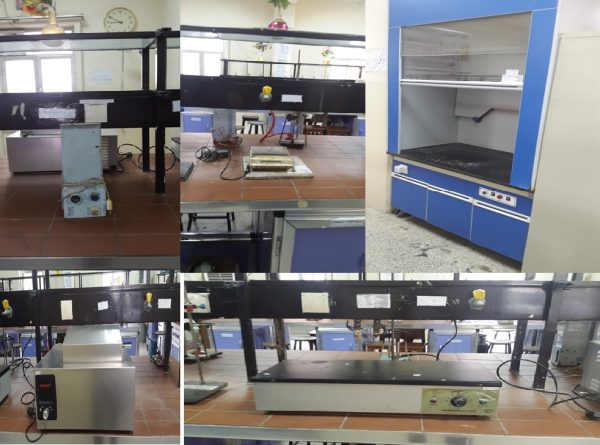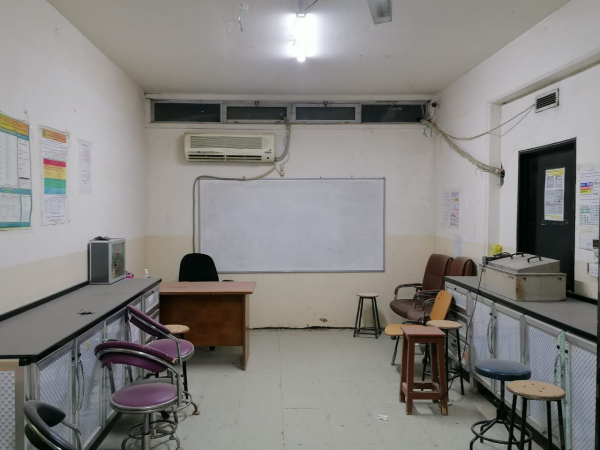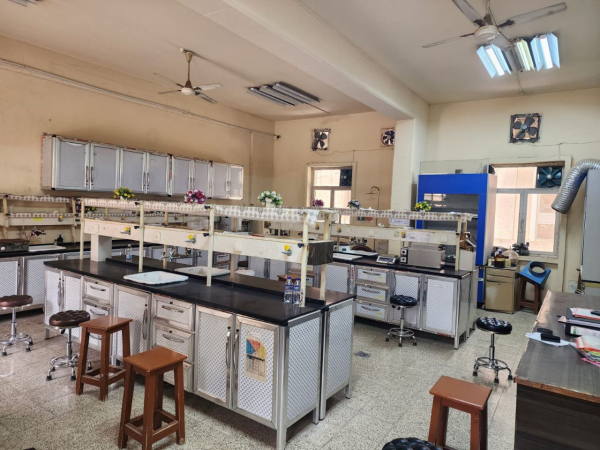Physical Chemistry Laboratory
The physical chemistry laboratory is considered one of the important laboratories in the Chemistry Department, where scientific experiments related to kinetic studies are conducted, which include studying the rates of chemical reactions, measuring kinetic properties, calculating the order of the reaction and the speed of the reaction, and studying electrochemistry in terms of applying Faraday’s law and studying the electrical conductivity of solutions. This is for the third stage. As for the second stage, scientific experiments include thermodynamics, thermochemistry, and chemical properties of some prepared materials and solutions. These scientific experiments are an application of theoretical study through the application of mathematical laws and rates, in addition to providing the appropriate environment for conducting experiments in terms of occupational safety.

Automated analysis chemistry laboratory
The analysis and study of the types and quantities of useful and unknown compounds, such as: the main components in foods, medicines, cosmetics, and other consumer goods that we usually deal with on a daily basis, is carried out practically in the analytical chemistry laboratory and their chemical compositions are identified through the availability of scientific equipment in the laboratory.

Biochemistry laboratory
Teaching the basics of biochemistry to female students in the Chemistry Department, as it is one of the basic requirements of modern science. Where the student learns how to conduct general life experiments (sugars, proteins, fats, and enzymes) and various clinical examinations through the use of medical hand tools. The laboratory aims to prepare female graduates who specialize in the fields of life chemistry, with an academic qualification (bachelor’s degree) and scientific and practical experience that will help them solve problems and provide scientific and diagnostic consultations in the practical field. The laboratory aims to develop the competencies of female students and workers in the biochemistry laboratory, making them able to perform and improve the educational process at the university.

Organic chemistry laboratory
The organic chemistry laboratory is considered one of the basic laboratories in the Chemistry Department, where practical experiments are conducted and how to prepare some organic compounds, in addition to extracting and distilling solvents and studying some of the physical properties of organic compounds for the second and third stages. As for the fourth stage, unknown substances are diagnosed and identified by following the basic work methods for detection. about her. These practical experiments are an application of theoretical study from organic chemistry sources. This is in addition to providing an appropriate environment for conducting experiments in terms of occupational safety, as well as the presence of explanatory posters regarding occupational safety procedures in laboratories.

Inorganic Chemistry Lab
This lab provides experiments for students where experiments are studied and conducted to prepare and purify compounds of the main group elements. Experiments are also conducted and taught where compounds of the transition elements are prepared and identified by measuring their physical properties or spectroscopic methods. In addition to learning about crystalline materials and their properties, understanding the chemistry of transition elements, the formation of complexes and precipitates and their types, and learning about different precipitating reagents.


